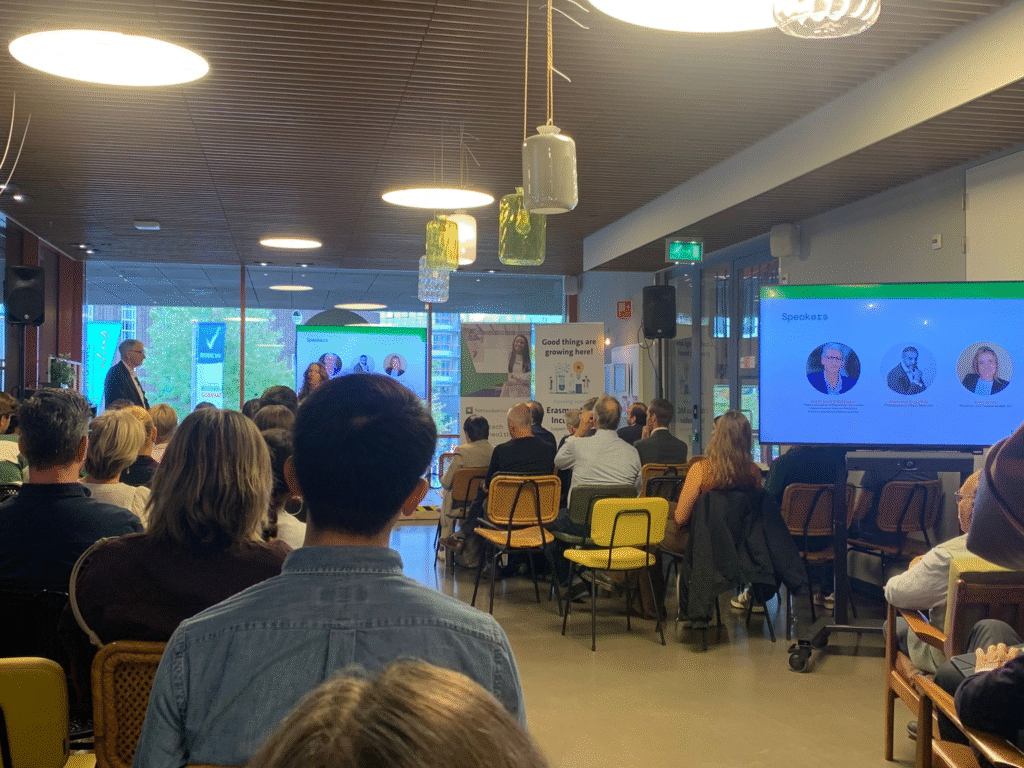On September 18th 2025, Claudia Milazzo and Henk Viëtor attended the Rotterdam Square Event. The event’s theme was ‘From Genomic Insights to Diagnostic Impact. Despite the enormous progress in molecular genetics over the last 40 years, the number of new clinically relevant tests has been limited. Despite their importance, bringing high-value diagnostic innovations to market remains a challenge. The event showcased successful Rotterdam-based initiatives demonstrating how breakthrough research can be translated into impactful products.
Key takeaways Rotterdam Square Event
- Molecular diagnostics underpin 70% of medical interventions, but face hurdles in market translation.
- GWAS arrays are a cost-effective and scalable tool for implementing precision diagnostics.
- SkylineDx and iDX show how Rotterdam Life Sciences businesses successfully convert research into clinical impact.

SkylineDx’s shows diagnostics done right
SkylineDx’s trajectory over the past 12 years is a testament to perseverance in diagnostics innovation and successfully bringing diagnostics with a high clinical additive value to the market. Their SKY92 test enables personalized treatment strategies in Multiple Myeloma, while the Merlin test prevents unnecessary surgeries in melanoma patients. Both products are already reimbursed and available internationally—showcasing the real-world impact of diagnostics done right.
GWAS essential for precision medicine approach
At the Rotterdam Square Event, Prof. Uitterlinden emphasized that nearly all diseases and risk factors have a genetic component. He highlighted the versatility of GWAS arrays: accurate, sensitive, customizable, and cost-effective. These features make them essential for precision medicine approaches. The integration of these findings into clinical care is already underway, from actionable mutations to polygenic risk scores and pharmacogenomic markers. The challenge remains to ensure wide accessibility to diagnostics and provide clear, actionable value for patients and clinicians.
This point strongly resonates with FFUND’s mission. By following these developments, we not only stay on top of industry trends but also strengthen our ability to guide stakeholders in bringing impactful diagnostics to patients more effectively.
Europe’s collecting of genetic data: both a challenge and opportunity
Prof. Uitterlinden raised another important point: Europe is lagging in collecting genetic data, which is crucial for advancing research and ensuring equitable access to the benefits of precision medicine. Without robust data, there is a risk of slower innovation and missed opportunities to improve patient outcomes across diverse populations. This presents a challenge as well as a strategic opportunity: Europe needs to build the infrastructure and frameworks necessary to support preventative care and equitable access to personalized treatment across diverse populations.
At FFUND, we see this development as a call to action for the Life Science community. For researchers, it highlights the importance of embedding strong data-sharing strategies into their projects. For innovators, it opens clear opportunities to position proposals in EU funding schemes that are increasingly prioritizing large-scale health data platforms, personalized medicine, and equitable access to innovation.
See you next time
To provide the best support and strategic advice possible, the FFUND team ensures they stay up-to-date with the latest developments and innovations in the field. To do so, we regularly visit leading life science events and share our insights with you here.
We will next be attending Bridge for Impact by Health~Holland on the 7th of October. Hope to see you there!

